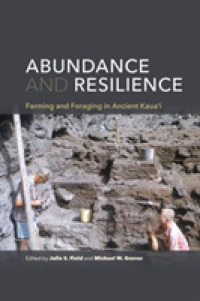- ホーム
- > 洋書
- > ドイツ書
- > Social Sciences, Jurisprudence & Economy
- > Politics, Society, Work
- > political science
Full Description
The problems related to the process of industrialisation such as biodiversity depletion, climate change and a worsening of health and living conditions, especially but not only in developing countries, intensify. Therefore, there is an increasing need to search for integrated solutions to make development more sustainable. The United Nations has acknowledged the problem and approved the "2030 Agenda for Sustainable Development". On 1st January 2016, the 17 Sustainable Development Goals (SDGs) of the Agenda officially came into force. These goals cover the three dimensions of sustainable development: economic growth, social inclusion and environmental protection.
The Encyclopedia of the UN Sustainable Development Goals comprehensively addresses the SDGs in an integrated way. It encompasses 17 volumes, each one devoted to one of the 17 SDGs. This volume addresses SDG 9, namely "Build resilient infrastructure, promote inclusive and sustainable industrialization and foster innovation" and contains the description of a range of terms, to allow a better understanding and foster knowledge about it. This book presents a set of papers on the state of the art of knowledge and practices about three important aspects of sustainable development, infrastructure, industrialization and innovation. It focuses on the support of cleaner technologies, enhanced scientific research, domestic technology development and universal internet access.
Concretely, the defined targets are:
Develop quality, reliable, sustainable and resilient infrastructure, including regional and transborder infrastructure, to support economic development and human well-being, with a focus on affordable and equitable access for all
Promote inclusive and sustainable industrialization and, by 2030, significantly raise industry's share of employment and gross domestic product, in line with national circumstances, and double its share in least developed countries
Increase the access of small-scale industrial and other enterprises, in particular in developing countries, to financial services, including affordable credit, and their integration into value chains and markets
Upgrade infrastructure and retrofit industries to make them sustainable, with increased resource-use efficiency and greater adoption of clean and environmentally sound technologies and industrial processes, with all countries taking action in accordance with their respective capabilities
Enhance scientific research, upgrade the technological capabilities of industrial sectors in all countries, in particular developing countries, including encouraging innovation and substantially increasing the number of research and development workers per 1 million people and public and private research and development spending
Facilitate sustainable and resilient infrastructure development in developing countries through enhanced financial, technological and technical support to African countries, least developed countries, landlocked developing countries and small island developing states
Support domestic technology development, research and innovation in developing countries, including by ensuring a conducive policy environment for, inter alia, industrial diversification and value addition to commodities
Significantly increase access to information and communications technology and strive to provide universal and affordable access to the Internet in least developed countries
Editorial BoardOluwabunmi Opeyemi Adejumo, Leah A Dundon, Lizhen Huang, Heather Jones, Haruna Musa Moda
Contents
Accessibility as a Precondition for Sustainable Development.- Active Modes and Sustainability.- Addressing Local and Global Sustainability in the Age of Sustainable Development Goals.- Airports' Role and Operations in the International Environment.- Application of SDG9 in Small Scale Sugarcane Agroindustries.- Artificial Intelligence and the Future of Businesses.- Assessing Urban Liveability in Africa: Challenges and Interventions.- Assessment of Resilience in Complex Urban Systems.- Autonomous Vehicles and Their Implications to Society.- Climate Change Adaptation: Infrastructure and Extreme Weather.- Climate Strategy Proactivity (CSP) and Its Theoretical Underpinnings.- Co-creation of Sustainable Infrastructure Development in Namibia.- Complex Adaptive Systems.- Construction Supply Chains and Their Role in Sustainability.- Corporate Social Performance.- Corporate Social Responsibility and Sustainable Development Goal 9.- Cradle-to-Cradle Front-End Innovation: Managementof the Design Process.- Defense, Innovation, and Costs: An Economic Analysis.- Designing Enhanced and Effective Entrepreneurial Access to Financial Services.- Development of New Skills: Innovation and Sustainability in Industry 4.0.- Digital Vulnerabilities and the Sustainable Development Goals in Developing Countries.






